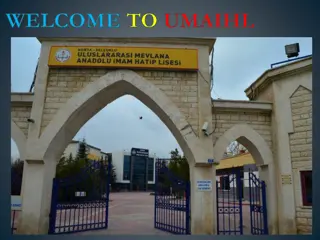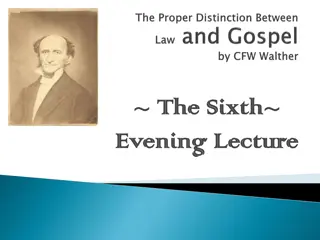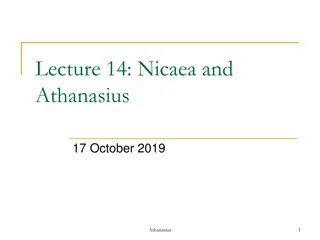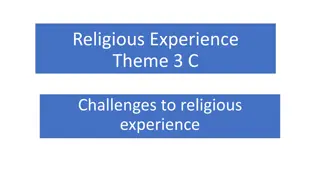The Abdication of Imam Hasan and the Theological Dilemma
The abdication of Imam Hasan refers to his renunciation of the caliphate in favor of Muawiya, sparking theological trauma and debate within the Shi'i community. This decision, contrary to his lineage and perceived duty, led to questions about divine leadership and the nature of political power. Different interpretations have emerged, with some seeing it as a missed opportunity for military action, while others view it in a theological context, considering the broader implications of upholding faith amidst political challenges. The reconciliation of Imam Hasan and Imam Husayn's responses offers insights into their approaches to political and moral dilemmas, emphasizing community support and the preservation of Islamic values.
Download Presentation

Please find below an Image/Link to download the presentation.
The content on the website is provided AS IS for your information and personal use only. It may not be sold, licensed, or shared on other websites without obtaining consent from the author. Download presentation by click this link. If you encounter any issues during the download, it is possible that the publisher has removed the file from their server.
E N D
Presentation Transcript
THE ABDICATION OF IMAM HASAN
What is the abdication of Imam Hasan? The abdication of Imam Hasan (d. 50/670), the second Shi i Imam and the fifth righteous caliph, from the caliphate refers to his renunciation of the caliphate in favour of Muawiya (d. 60/680) in year 41/661. His personal and religious qualities, accompanied by his lineage, made him the most suitable candidate for the caliphate after his father s death. However, Muawiya, who had been the governor of Damascus and surrounding regions since 18/639, had already consolidated power and rebelled against Imam Hasan.
A Theological trauma for the Shi is? The divinely appointed Imam Hasan abdicated leadership in favour of Muawiya? If the leadership of the Muslim community was the divine right and duty of the Imams, how could Imam Hasan give up on leadership without a fight ? Muawiya was the son of Abu Sufyan who was an arch-enemy of the Prophet.
A missed opportunity? In Iraq and Hijaz People had already pledged allegiance to Imam Hasan. He had a sizable army stationed under his command in Kufa. There was a precedent for a fight: Imam Hasan s father, Imam Ali, fought bloody campaigns against fellow Muslims to defend his leadership.
Making a theological sense of the abdication Imam Husayn, paid a hefty price for challenging Yazid in Karbala. While Imam Husayn wanted to assemble an army to fight against Yazid, Imam Hasan disbanded his existing army for the sake of peace. Two main approaches to the event: 1. It was the decree of God that forced Imam Hasan to make peace with Muawiya. 2. The justification of the abdication within the historical context of the events and placing it in a framework of people s unrelenting betrayal of the cause of God and the Imams.
Reconciliation of the two extreme reactions Imams either decided to remain silent like Imam Hasan or to fight against corruption like Imam Husayn. In the considering the best course of action they had two primary considerations: 1. The pledge or support of the community: there was no point in declaring Imam s claim to political leadership unless the community explicitly expressed their readiness to make a stand in support of their claim. 2. The interest or maslaha of Islam: if there was an imminent danger to the community that would alter the divine message of God, they took decisive action to avoid it. This is where Imam Husayn s uprising is placed.
The argument of free-will God has bestowed human race with free will, which enables them to make choices. Free will is the most important component of the trial in this world, and God rarely interferes with the free will of people. Had God wished, those who succeeded them would not have fought each other after the manifest proofs had come to them. But they differed. So, there were among them those who had faith, and there were among them those who were faithless and had God wished, they would not have fought one another, but God does whatever He desires. (Q. 2: 253)
The argument for drastic action God only interferes with human actions when, as a whole, society makes the decision to indulge in corruption and immorality. In such times, He takes decisive action to reset the ethical parameters of society by wiping off entire generations on the earth. Shi is believe that the Imams, who have best understood God s instructions in this matter, acted accordingly. They took a drastic action when it is absolutely necessary.
Imams did not impose themselves on the community It would be a catastrophic failure on the side of Imams to impose themselves on the Muslim community, as they were not driven by their desire for power as would be kings. They were guides for the community to elaborate on the teachings of the Prophet Muhammad, and guidance cannot be imposed upon people. Imam Ali, addressing Ibn Abb s, said: This Caliphate is more trivial to me than an old shoe unless I restore a right or redress a wrong. (Nahjul Balagha, Sermon - 33) If God wished, He could have forced everyone to embrace the faith: Had Allah willed, He would have made you one nation [united in religion], but [He intended] to test you in what He has given you; so race to [all that is] good. To Allah is your return all together, and He will [then] inform you concerning that over which you used to differ. (Q. 5:48)
The historical context: The succession of Imam Hasan Upon dealing with the Khawarij, Imam Ali was planning to finish off Muawiya and had assembled a 40,000 strong army in Kufa. But he was assassinated before accomplishing his plan. When Imam Ali realised that his death was imminent, he ordered Imam Hasan to lead the prayer. He then said: My son, you are the trustee of authority and of blood. Imam Ali gave Hasan the Book and the weapon, and said: My son, the Apostle of Allah, may Allah bless him and his family, has ordered me to entrust you and to give you my books and my weapon as the Apostle of Allah entrusted me and gave me his books and his weapons. the Prophet also ordered me to tell you that when death comes to you, give them (the books and the weapon) to your brother al-Husayn. 1 When Imam Ali died, Imam Hasan addressed the people of Kufa. He spoke about the merits of his father Ali, his grandfather Prophet Muhammad and reminded them of his right to authority. Ibn Abbas then emerged in front of him and said: People, this is the son of your Prophet, the testamentary trustee (wa ) of your Imam. So, pledge allegiance to him. People then rushed forward to pledge allegiance to him. 2
The divisions in Kufa Husain Mohammad Jafri, in his The Origins and Early Development of Shi a Islam, provides a detailed insight into the formation of the garrison city of Kufa and its deeply heterogeneous nature. Only a small number of them were true followers of Imams Ali and Hassan. This was the reason for their limited support for Imam Ali and he condemned the people of Kufa on many occasions: When I order you to march toward them during the summer season, you say. This is the season of intense heat; grant us respite until the heat has abated from us. And when I command you to proceed toward them in winter, you say. This is the season of intense cold; give us time until the cold is dispelled from us. With all this fleeing from heat and cold, by God, you will flee even more readily from the sword. O you who look like men but are not men, having the intellect of children and the wits of women, I wish I had never seen or known you, for acquaintance with you has drawn regret and brought in its wake grief and sorrow. May God destroy you. You have filled my heart with pus and have lined my breast with anger. You have made me drink draughts of anxiety one after the other and have corrupted my judgment by your disobedience and desertion, so that Quraysh say that the son of Abu Talib is a brave man but had no knowledge of warfare. For God be their father! Is any one of them more experienced in warfare or does any of them occupy a place in it higher than mine? I started fighting when I was not yet twenty years of age, and here I am the same fighter when I have passed the age of sixty. But there could be no judgment for him who is not obeyed. (Nahj al-Bal gha, 76-79)
Upon his succession, Imam Hasan wrote the first letter to his main contender, Muawiya. In the letter, he asked for Muawiya s allegiance, and threatened him with war : If you insist on your error, I will advance against you with the Muslims and punish you till Allah judge between you and me, and He is the best of all judges. Confrontation with Muawiya Muawiya could not praise his lineage as Abu Sufyan was neither a match for Imam Ali nor Prophet Muhammad. Instead, he made use of the names of caliphs Abu Bakr, Umar and Uthman, and hinted at the disagreement of the members of Ahl al-Bayt on the pledge of allegiance to Ab Bakr. By doing so he tried to play down Imam Hasan s claim that Ahl al-Bayt had the right to succession.
The two betrayals of Kufans When Muawiya advanced towards Iraq, he sent a letter to Ubayd All h b. Abb s, who was the commander of Imam Hasan s vanguard forces which were tasked with stopping the advance of the Syrian army. The report notes that Muawiya offered Imam Hasan a million dirhams and he accepted the offer. Consequently, Ubayd All h b. Abb s, with eight thousand fighters, joined the ranks of Muawiya, which left his replacement Qays b. Sa d with 2000 fighters. Muawiya forwarded Imam Hassan the letters that he had received from some of the prominent tribal leaders of Kufa. In these letters these traitors confirmed that they would listen to and obey Muawiya. They urged Muawiya to come to Kufa quickly and asked him for positions. Finally, they guaranteed to hand over al- Hasan or to kill him when Muawiya arrived .
The Treaty, in 41/661 According to the agreement, Muawiya offered Imam Hasan a million dirhams annually in addition to the land tax of Fas and Dar bjerd, for which asan could send his tax-collectors. In return, Muawiya offered that upon his death, Imam Hasan would become the caliph. Muawiya would grant safety to the people who had pledged allegiance to Imam Hasan. Finally, he would act according to the Qur an and Sunna of the Prophet Madelung notes Imam Hasan s response upon seeing the financial incentive offered by Muawiya was trying to appeal to his greed for something which if he had desired it, would have not surrender to him. After the agreement, Imam Hasan s opponents continuously raised the point that he was a greedy man and abdicated the caliphate for financial incentives. But this is a baseless argument as Imam Hasan states that had he been after financial gains and power, he would have tried his chances against Muawiya as caliphate which would have brought him more power and wealth.

















































